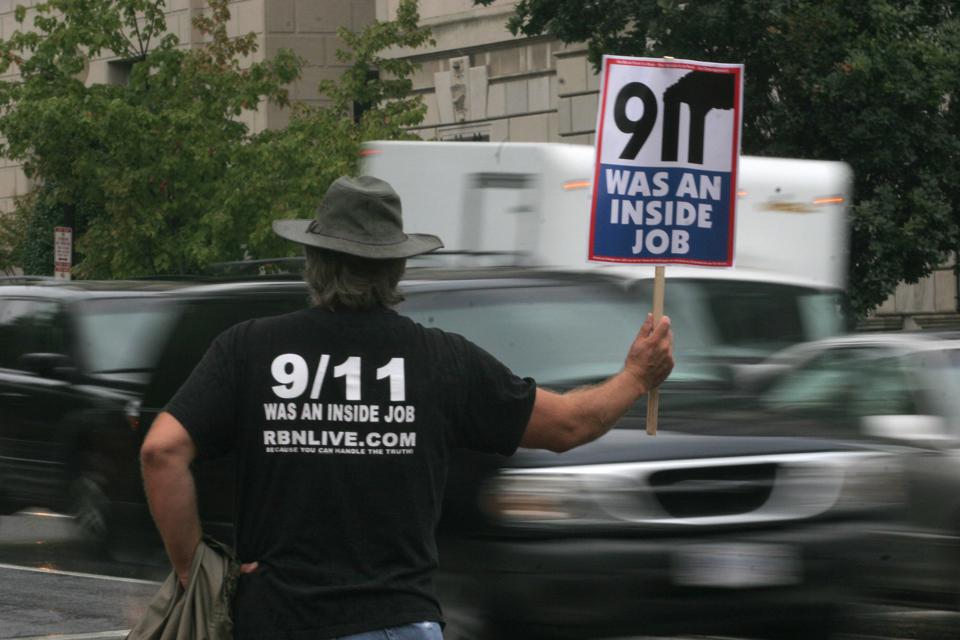Conspiracy Theories Have Gained Traction Since 9/11 Thanks To Social Media

A protestor holds a sign claiming the 11 September 2001 attacks on the US were an inside job near … [+]
AFP via Getty Images
Even as first responders rushed to ground zero 19 years ago on September 11 the “theories” as to who was actually involved in the attacks began to spread. Those theories gained traction in the days and weeks that followed – the conspiracy theorist suggested it was an inside job, a false flag operation, steel doesn’t burn, the Twin Towers were brought down in a controlled explosion, no plane hit the towers and no plane certainly hit the Pentagon.
In the months and years that followed all of those wild theories were proven to be wrong.
As time passed, the theories around 9/11 died down. Moreover, even those who led the charge with films such as the well-polished/well-produced documentary Loose Change began to change their opinion in recent years.
Conspiracy theories aren’t new of course, and they certainly didn’t begin with the 9/11 terrorist attacks. From the assassination of President Abraham Lincoln to the attack on Pearl Harbor to the assassination of President John F. Kennedy there have been theories that suggested that the “official” findings weren’t the “truth” even if the evidence is/was overwhelming.
“Conspiracy theories have a long history in American society,” said Dr. Kent Bausman, professor in the Online Sociology program at Maryville University.
“Think back to the very earliest settlers and their connection with the Salem Witch Trials,” Bausman added. “The fact that conspiracy theories have such prevalence throughout U.S. history suggests that they do serve some form of societal function for segments of the population,” he added. “Conspiracy theories serve to give oversimplified, often illogical accountings for the collective unease large segments of our society feel from time-to-time. They often gain the most traction when sudden unexpected events happen that we had not previously accounted for, such as 9/11. They give individuals an immediate sense of understanding and a source (scapegoat often) to attribute blame for their sense of the collective unease they feel in society.”
Social Media And Conspiracy Theories
The situation with conspiracy theories has only intensified thanks to social media. It falls into the category of misinformation/disinformation. During the Covid-19 pandemic wild theories run abound – China created coronavirus in a lab, coronavirus was weaponized and 5G mobile networks were helping spread it.
But social media has spread other conspiracy theories too, notably everything about QAnon.
We must ask, could such theories even gain any traction were it not for social media?
“Social media platforms like Facebook and Twitter make it easier to propagate fake news and conspiracy theories easier than ever,” warned tech industry consultant Lon Safko, author of The Social Media Bible. “Before these platforms, if you believed there were aliens among us or Elvis was alive and hidden in the witness protection program, it was difficult to tell your story in front of enough people to get to the right ones who believed it and would pass it along.”
It is a case of sheer numbers in the case of social media.
“Today, when Facebook has 2.7 billion users and Twitter 330 million users, not to mention all the other social platforms, you can now accumulate a critical mass,” added Safko. “If only one out of a 1,000 regular people would believe your ‘absolute truth’ crazy story, today, you still have access to 2,790,000 on Facebook alone.”
The New News Platform
Another part of the problem is that so many mainstream news outlets are in decline. Instead of looking to trusted journalists and reporters who break stories and research facts, people accept what people tweet or post – and accept that as news.
This in turn allows these conspiracies to find an audience – one that is larger than any single media outlet today.
“The social platforms give these fringe stories credibility by association,” explained Safko. “They are posted there, alongside hundreds of other, credible stories and there is no way to really tell the fake news from the real news.”
This also comes as people are less trusting of the news yet will put that trust in social platforms.
“The polarization of media sources combined with the ease of sharing on social media has led to conspiracy theories to be more pervasive than ever before,” added Dr. Mai-Ly Nguyen Steers, assistant professor in the school of nursing at Duquesne University.
“People tend to buy into conspiracy theories because they are engaging in what social psychologists have deemed as ‘motivated reasoning,’” added Nguyen Steers. “That is, they are more apt to accept and rationalize a conspiracy theory that falls in line with their pre-existing worldview. This is compounded by the fact that look and feel of fake news is often like real news and in the past, this misinformation has not been vetted by either social media platforms or the sharers of the social media content.”
Ease Of Proliferation
The other reason that a conspiracy theory can gain traction and go from a fringe theory to an almost accepted fact – such as the widely held belief that Covid-19 started in a lab despite top medical officials stating the numerous reasons why it is unlikely – is that information can spread faster than ever.
“What has dramatically changed is the currency that is given conspiracy theories today,” suggested Bausman. “This is due in large part to their ease of proliferation in the culture through social media.”
Yet, it is not simply that the public has greater exposure to such theories for consumption but that they have so much currency today.
“It is also the manipulation of credibility that social media platforms bestow on these theories,” Bausman added. “Bluntly speaking, people that are less likely to engage in critical thinking are most susceptible to believing such theories. These same individuals are also more likely to assume something is credible simply because they viewed it on the Internet.”
Close Association
The other aspect of social media in spreading such theories is that users have built in “trust” with those they’ve “friended” or regularly follow. As newsrooms have shrunk and the political divide has made many question whether the news outlets are biased, we trust those we know.
“It is costly to question and critique every piece of information we encounter, so we rely on social cues to attribute validity to a message,” said Dr. Jorge Barraza, Ph.D., professor in the online Master of Science in Applied Psychology program at the University of Southern California. “Social media amplifies the impact of these theories as they are shared by friends and relatives. Even when they are not shared by known others, the information is intermingled with content from trusted others so it is more likely to be trusted too.”
Combating The Wilder Theories
While it could be argued there is no real harm done by believing aliens live at Area-51 and many could question whether it matters who pulled the trigger that killed President Kennedy.
But there is a danger in some conspiracies today. Believing Covid-19 to be a hoax could put people at risk and allow the illness to spread.
While in the past authors have responded to the more outlandish conspiracies and editors at Popular Mechanics even wrote a book to debunk the wildest of the theories, combating such misinformation/disinformation on social media is increasingly challenging.
“We are less likely to question information that fits our world view,” explained Barraza. “What amplifies this phenomenon is that, like with any other beliefs, counter-arguing a conspiracy theory can be counter-productive. Arguing with a person’s beliefs is found to typically strengthen those beliefs, especially if they are embedded in a larger network of beliefs.”
The question then becomes whether it is necessary to tune out when we come across such wild theories. The goal of many conspiracy theorists is to change minds, and those who quickly buy into the wilder theories are more unlikely to come back to the mainstream thinking.
“Should we debunk,” pondered Barraza.
“It depends,” he suggested. “Do we really need to debunk flat-earthers? Probably not, but there are conspiracy theories that could impact society at large like those that impact public health – e.g., vaccination. The best route is to inoculate people against conspiratorial thinking. It is easier to inform people on a topic rather than try to change their minds once a belief has taken hold. Uncertainty is a breeding ground for conspiratorial thinking.”
The best course of action is not to buy into those wilder theories.
“Some ways for users to combat the spread of misinformation are to critically think of where the information is coming from before they share,” added Nguyen Steers. “Ultimately, avoiding sharing misinformation is caring.”


